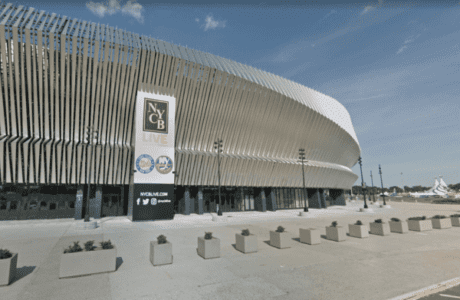
Las Vegas Sands officials said the company’s plan to transform the Nassau Hub includes a casino, hotel, a live performance venue, restaurants and a spa, though other details, such as the fate of the longstanding Nassau Coliseum, have yet to be decided on.
Sands Vice Presidents Ron Reese and David Paterson, the former New York City governor, provided Blank Slate Media with some more details on the plan to redesign the Nassau Hub into an entertainment center Thursday. Reese said the hotel will be at least 800 rooms and the live performance venue will have a 5,000-7,500 seat capacity.
Reese said there will be roughly 400,000 square feet of “corporate meeting facilities” and that other amenities will include fitness areas, a pool, celebrity chef and casual restaurants and other recreation facilities.
Despite the company’s name, Reese said, Nassau residents should not anticipate structures that belong in Las Vegas coming to Long Island.
“I want to be clear that I don’t want to call it a Las Vegas-style resort because I don’t think that’s appropriate,” Reese said. “It will be Las Vegas style in terms of amenities, but the size and design is going to fit in with the local look and architecture.”
Paterson said the company has a self-imposed April 1 deadline to have the application completed and be ready to go before the state. Reese said the company launched the plans to develop the Hub into this entertainment center a few weeks ago and did not make any commitment on what the fate of the Nassau Coliseum would be.
“In terms of the Coliseum, no determination has been made,” Reese said. “We just launched two weeks ago and so now our designers, architects and development team will really begin sort of a master plan that looks at what the best location to put parking garages in and what do you do with the Coliseum.”
Officials from the casino and resort company said they entered into agreements to purchase the long-term lease of the area home to the Coliseum and, if approved, would be in control of up to 80 acres of property known as the Nassau Hub.
Nassau County officials announced in 2020 that a deal was struck with Nassau Live Center LLC and Nick Mastroianni to take immediate control of the Coliseum as its new tenant.
Reese said that the company anticipates a minimum of 5,000 people working at the site, though no residential buildings are part of the Sands’ plan. Reese said the next steps for the Sands is for the Nassau County Legislature to approve the lease transfer of the Coliseum and the Hub.
The state’s gaming commission, he said, would then have to establish a five-member local board to approve the Sands bid. The board would be made up of appointees from the town supervisor, the county executive, the governor’s office and the local senate and assembly member representing the area.
Hofstra University President Susan Poser expressed concerns about the proposed entertainment destination and casino. Poser, the president of the university directly adjacent to the Coliseum, wrote in a guest essay in Newsday that a casino would exacerbate traffic, contribute to addiction and mental health tendencies in college-age students and would not guarantee an increase in revenue to the area.
“A casino at the Hub is not about the future, and it would not be an engine for economic and social prosperity,” Poser said in the essay. “It would be dangerous for adjoining neighborhoods, and create a nightmare of traffic and pollution, not to mention anti-social behaviors that often crop up around casinos.”
Reese said the company and Hofstra have engaged in discussions regarding the proposal and hopes to have a continued dialogue throughout the process.
“We don’t build $4 billion casinos, we build multi-amenity real estate developments and we want to engage with the community and local labor leaders,” Reese said. “We’ve spoken to Hofstra and we hope there are more opportunities to engage in conversation.”
In terms of the gross gaming revenue under the proposal, Reese said, 80% goes to the state and 20% goes locally. The local percentage would be split up between both Nassau and Suffolk County along with the Town of Hempstead, with Suffolk receiving 10% and Nassau and the town each receiving the remaining 5%.
Reese said the organization will not look to get a tax exemption or other subsidies to help offset building costs.







build it